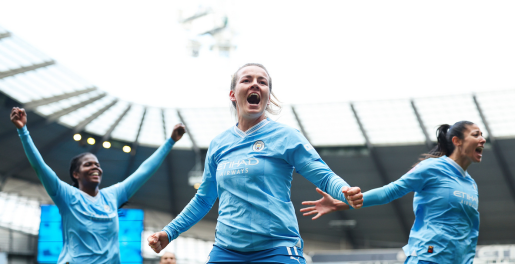The new Barclays Women’s Super League and Barclays Women’s Championship seasons are almost upon us and here’s what to expect from a match officiating point of view during the 2024/25 campaign.
While maintaining a robust approach to dealing with unacceptable behaviour and delaying the restart of play – measures that were introduced for 2023/24 – officials will also be implementing changes to the Laws of the Game, as laid out by The IFAB, for the forthcoming campaign.
A summary of these key changes, including updates to an element of denial of an obvious goal-scoring opportunity and the penalty-kick process, are below:
Denial of an obvious goal-scoring opportunity (DOGSO)
When an outfield player denies the opposing team a goal or an obvious goal-scoring opportunity by deliberately handling the ball and a penalty kick is awarded, the player will be sent off.
However, when an outfield player denies the opposing team a goal or an obvious goal-scoring opportunity by committing a handball offence whereby they make themselves unjustifiably bigger but without deliberate movement of the hand/arm to the ball and the referee awards a penalty kick, it will now result in a caution rather than a red card.
Deliberate handball + DOGSO = penalty + red card
Non-deliberate handball yet body unjustifiably bigger + DOGSO = penalty + caution
Penalty kick process – encroachment
A player’s position at a restart is determined by the position of their feet or any part of their body which is touching the ground, except as outlined in Law 11 (Offside).
The change for 2024/25 means that players who do not impact will not be penalised and, therefore, the same principle as goalkeeper encroachment will now apply to all players.
Examples of impact include:
• Defender clearly distracts / impacts the taker
• Attacker clearly distracts / impacts the goalkeeper
• Ball rebounds and defender prevents goal or goal-scoring opportunity
• Ball rebounds and attacker scores, attempts to score or creates goal-scoring opportunity
Alongside implementing the aforementioned law changes, officials will once again have the full support of the football authorities to deliver the stronger measures that were introduced ahead of last season, including maintaining a robust approach to dealing with participant behaviour when it falls below expected standards, both on the field and in the technical area.
Looking to maintain the enhanced ball in-play time across the Women’s Super League and Women’s Championship during the 2023/24 season, the exact time lost when certain game events occur will again be added. Events considered for this include goals and celebrations – a slight change for 2024/25 will see time added after an initial 30 seconds has elapsed. For example, if a goal and the subsequent celebration takes one minute, officials will add on 30 seconds at the end of the relevant half. Time lost for substitutions, injuries requiring treatment, penalties and red cards will also be included.
To support the accurate calculation of additional time, stadium clocks, scoreboards or giant screen timings will continue to run until the completion of each half, including any additional time at the end of the first or second half.
Clear and deliberate actions that are impactful in delaying the restart of play will also see players cautioned.
While protecting player safety will continue to be of paramount importance, the flow and tempo of the English game will again be recognised with match officials adopting a high threshold for penalising challenges with the emphasis on not all contact constitutes a foul.
Multiball
New for the 2024/25 season in the WSL and Women’s Championship, the use of the multiball system will be managed by the match officials under the Laws of the Game. There will be ten match balls in use:
• One ball in play
• One ball with the 4th official
• Eight balls distributed around the pitch, placed on a cone (two behind each goal and two along each touchline)
When the match ball goes out of play and is not quickly retrievable, players must go to the nearest cone to collect a replacement ball themselves to restart play. Ball assistants are not permitted to return a ball to a player but should return it to a vacant cone. Technical area staff who deliberately delay the restart of play by holding onto the ball or kicking the ball away will be sent off.
If they deem it necessary, the match officials may order that the multiball system be deactivated and a single ball system be implemented for the remainder of the fixture.
Handball is a subjective judgement and not every touch of a player’s hand / arm with the ball is an offence, with hand/arm position being judged in relation to body movement in that particular situation.
What constitutes a handball offence:
Arm movement
• Deliberate movement of the arm towards the ball
Arm position
• Makes body unjustifiably bigger
Mitigating factors:
• Justifiable position/action
• Supportive arm when player falls
• Player plays ball onto own arm
• Clear change of trajectory when touched by the same player
• Played by a team-mate
• Proximity
Holding is a continued area of emphasis and situations will be penalised when it’s sustained and has a clear impact on the opponent’s opportunity to play or challenge for the ball, including those non-footballing actions.
What to look for:
• Both arms is usually an offence, unless it’s not sustained and/or no clear impact
• One arm is usually an offence, if clear impact
• Shirt holding is usually an offence, unless it’s slight, short, or no clear impact
• Holding while focusing solely on the opponent and paying no attention to challenging for the ball (non-footballing action) is usually an offence
• Mutual holding is usually no offence







